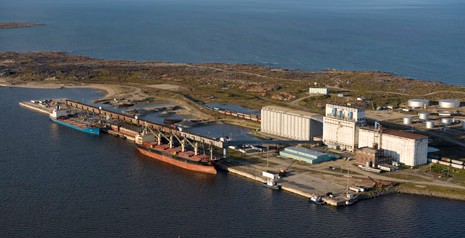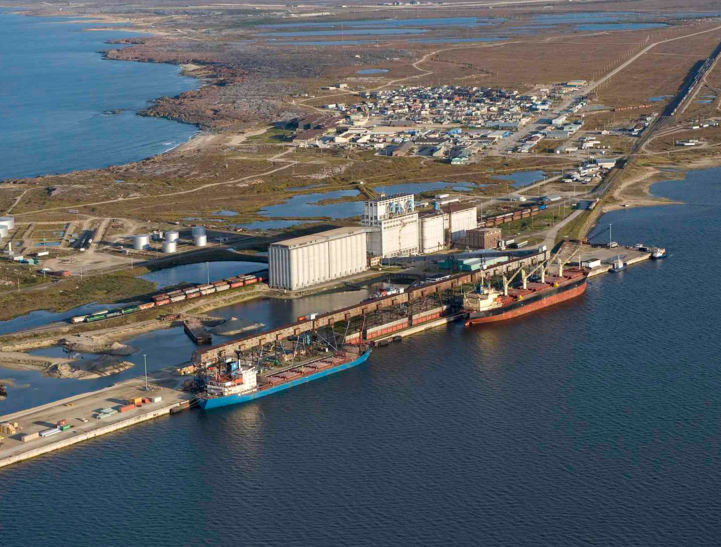by Steve Selden | Aug 5, 2016 | Churchill News

Port of Churchill grain shipping operation on the Churchill River. Port of Churchill photo.
A northern delegation comprised of representatives from the Town of Churchill and The Pas, City of Thompson, Hudson Bay Route Association, and the War Lake First Nation have met with provincial and federal governments to try to sort out the recent Port of Churchill closure by american based owner Omnitrax. The company closed the port and issued two – week lay – off notices on July 25th of this year.
No grain has been shipped through the Port of Churchill prior to the shut – down in what Churchill Mayor Spence has characterized a “bumper -crop year”. The “unforseen” circumstances that Omnitrax is siting as reason for closure have still not been disclosed by the company that purchased the facility in 1993 from the Government of Canada which was at the time divesting itself from numerous crown corporations. The current closure affects nearly 200 paid positions all along the Bayline.
Speaking for the northern delegation, Mayor Spence stated “this is an emergency situation for our community, our region and indeed our country. We’ve been told by farmers that there is a bumper crop and as an export country we can’t be shutting down ports if we are able to keep people employed and grow our economy”.
The delegation is in agreement that the Government of Canada at national and regional levels should take responsibility to insure that the Port of Churchill is of national interest. In this light all involved feel the Port of Churchill needs to be reopened and continue to function as a part of Canada’s national infrastructure. This new delegation has pledged to continue to diligently work with the branches of government to find a long term solution for keeping the port operations running.
Michael Constant, Chief of the Opaskwayak Cree Nation, reinforced the message by Mayor Mike Spence of Churchill stating “we have all come together to find a workable long term solution and we are prepared to advance a northern regional ownership model that we feel is the best approach going forward”.
Last December a group of Manitoba First Nations purportedly was in the process of finalizing an agreement to purchase the Port of Churchill though that news has simmered somewhat as no definitive sale has been finalized.
by Steve Selden | Mar 24, 2016 | Churchill News

The Port of Churchill sale expected to go through soon.
Anticipation of Manitoba’s port of Churchill and the Hudson Bay rail-line sale going through is building. The deal involving current owner Omnitrax from Denver, Colorado and a group of Manitoba First Nations are expected to finalize the sale in the short term. Omnitrax is opting out of the grain shipping business as a result of decreased numbers. After the Canadian Wheat Board dissolved and government incentives dried up, the shipping quota dwindled to 186,000 tons this past fall season- about a third of the average total for past seasons. It just seems as if Omnitrax’s heart wasn’t in the business as shipping totals have fallen consistently over the last few years. Hopes are high that a localized group with more alliances will spur growth and provide consistent employment for more local people in Churchill. Stay tuned for updates!
by Steve Selden | Feb 17, 2016 | Churchill News

Port of Churchill grain shipping operation on the Churchill River. Port of Churchill photo.
Canadian Prairie farmers from Manitoba and Saskatchewan have decided to press for the reestablishment of a the Canadian Wheat board, a single-desk system for marketing their grain to various world markets.
Over 50 farmers from the Pelly and Swan River areas of Saskatchewan and Manitoba met last week and passed a unanimous resolution requesting the re-establishment of the Canadian Wheat Board according to the Canadian Wheat Board Alliance.
The group says the loss of the Coordinating core board has lead to an increasingly disorganized, hap – hazard rail system, inconsistent grain quality guarantees for other nations and an $6.5 billion overall income loss for farmers over the past two years.
For more than 70 years, prairie farmers were forced to sell their grains to the CWB, which then would export it to foreign markets.Former agriculture Minister Gerry Ritz passed legislation ending the Canadian Wheat Board in 2012, and last year half of its assets were ultimately sold off to Saudi-owned G-3 Global Grain Group.
Ritz at the time had this to say: “Overall, logistics have been good,” said Ritz. “We’re seeing market share in premium markets going up. We’ve had no problem at all when we’re talking free trade agreements with other countries, they welcome the opportunity to buy more Canadian wheat. Apparently things are not going as planned.
However, with he Port of Churchill under consideration for purchase by a native group in Canada from current owner Omnitrax, this possible “renewed” direction could bode well for more consistent shipping from the Arctic port.
by Steve Selden | Dec 21, 2015 | Churchill News

Port of Churchill grain shipping operation on the Churchill River. Port of Churchill photo.
A First Nations group based in Northern Manitoba is in the process of buying the Port of Churchill and Hudson Bay rail line from OmniTrax, a Denver ,Colorado based company. The town known as the polar bear capital of the world has been struggling to keep the ancillary business viable in these changing times.
The First Nations group provided a letter of intent for the purchase of the port and the Hudson Bay line – the stretch of track from The Pas to Churchill – as soon as both sides complete necessary research on the transaction.The rail line is the lifeline that connects all the small communities that have no road access in the region.
“It’s a group of communities along the line and others that, you know, over the period of time have always believed the railway was theirs. This now can become a reality based on current negotiations,” said OmniTrax president Merv Tweed. With the invested interest that the group has to keep the rail line running smoothly as a means of access to their remote communities, train service there and onto Churchill should thrive for the distant future.
At this juncture of the negotiations the buying group nor the purchase price of the assets has not been specifically identified.
“They’ll make their own statement in their time,” Tweed said.
For the next 45 days OmniTrax and the First Nations group will engage in a “due diligence period in which both parties will work together to ensure that a purchase becomes a reality,” a news release from Omnitrax stated. Omnitrax has agreed to work with the First Nations group for the next several years to facilitate a smooth transition. However, given the lack of success that Omnitrax has had in managing the port and increasing the shipping quota, this new regional rooted infusion might be a time to try new strategies for building the business and attaining higher levels of success.
OmniTrax acquired and began operating the port and rail line in 1997, though a reduction in grain shipments has placed financial strain on the operation. An attempt to diversify and specifically ship oil through the port was met with voracious public outcry which inevitably killed the initiative. The operation just seemed dead in the water after that battle this past year.
All these factors combined spurred the company to announce earlier this month plans to sell the operations. A quicker than expected sale agreement and local interest in the growth of the operation has instilled high hopes for the next phase in the life of the Port of Churchill. The operation employs roughly 100 local workers.
by Steve Selden | Sep 18, 2015 | Churchill News

Grain vessel awaits docking at the Port of Churchill. Photo Steve Selden
The Churchill shipping season is off to a late start this fall, nearly a month behind its regular schedule for shipping grain and wheat products from the port to various countries worldwide.
Late harvest, shallow inventory as well as shipping industry variables have created a created a time sensitive shipping schedule to attain the slightly lower average tonnage threshold according to Merv Tweed, OmniTRAX Canada president. OmniTRAX is the owner/operator of the Port of Churchill and they hope to reach 400,000 to 500,000 tonnes of grain by November and the end of the shipping season.
With this goal about 12 and 15 ships will make Churchill a port of call this year. Between now and the first week of November, the port will have to hustle to meet the quota projected. Sea ice will begin to clog passages at that time and ships will be unable to safely pass through Hudson Bay to reach Churchill.

Port of Churchill frozen and shut down for the season. Photo Steve Selden
“We’re seeing the volumes increase. The biggest challenge the grain sellers have is just getting the ship allocation,”stated Tweed. “No one seems to know why (the ships are late in arriving), other than that it was a late grain season.”
Lentils have made a return to the shipping docket as two ships are now scheduled for this season after a few years absence from the product ledger.
“We are hoping it will become a bigger opportunity as the market for lentils grows,” Tweed said. “It may become the specialty crop that we grow our business on just based on the amount of production coming out of northern Saskatchewan.”
Northern Saskatchewan is the prime supplier to the port of Wheat and grain products across the board with 70 per cent production from that region.
A few years ago, OmniTRAX announced plans to get into the crude oil shipping business, however that agenda has not materialized amid public outcry. Tweed indicated that oil transport is no longer being pursued. The surprise announcement that a $22 million Churchill Marine Observatory to study the detection, impact and mitigation of oil spills in the Arctic raises questions as to future possibilities of such commerce.
For now only grain products will leave the port and this season will be a condensed and frantic one to say the least!





